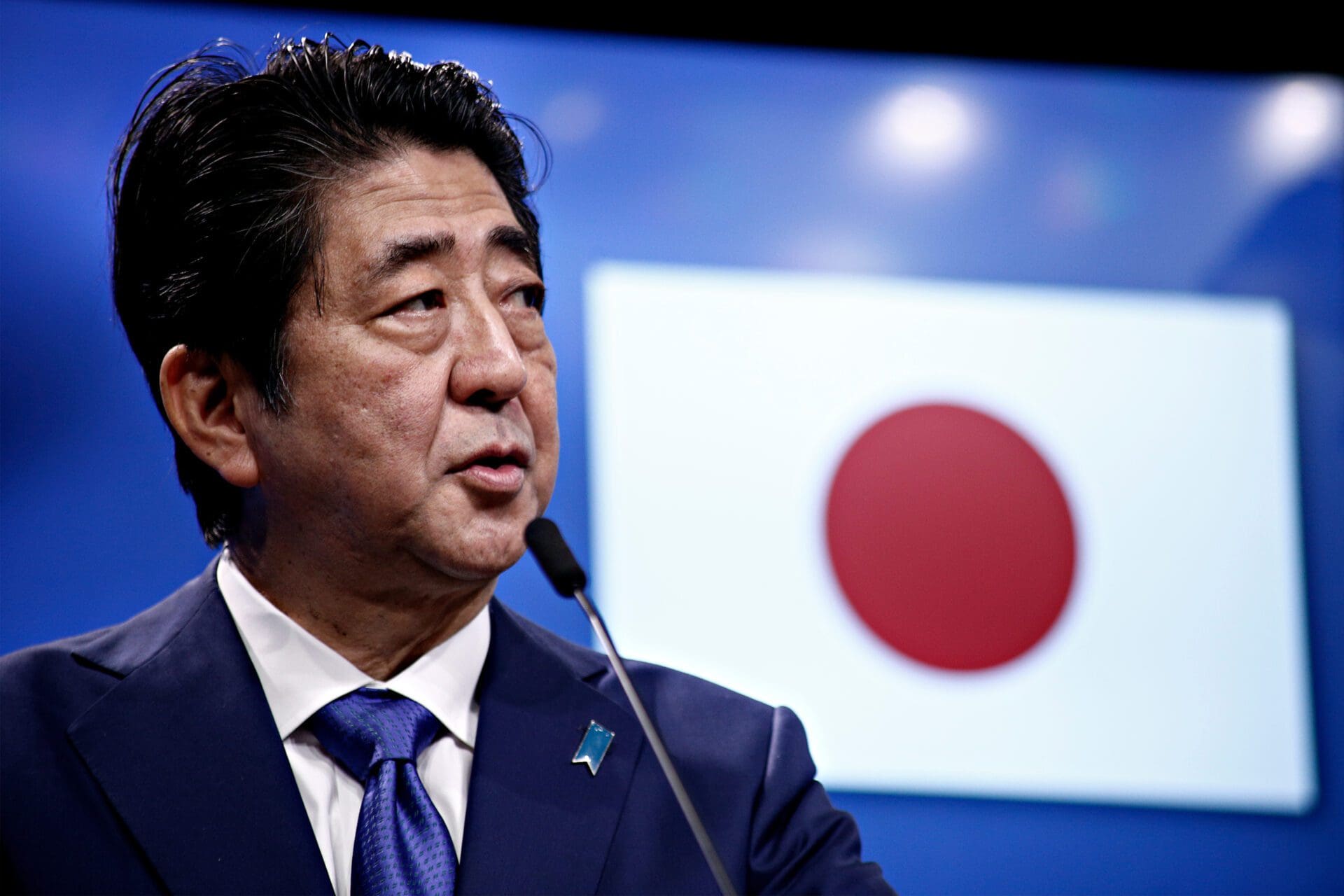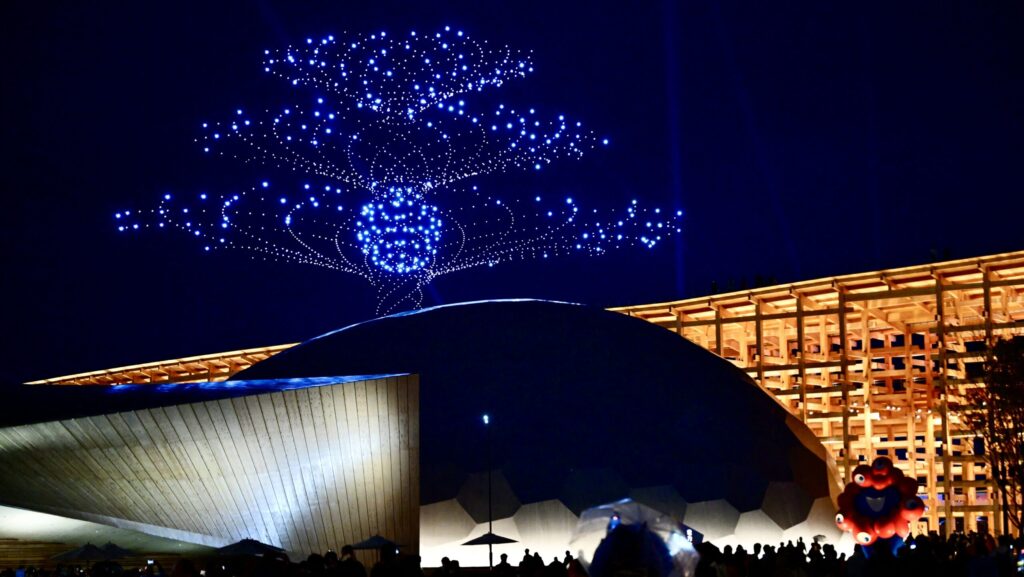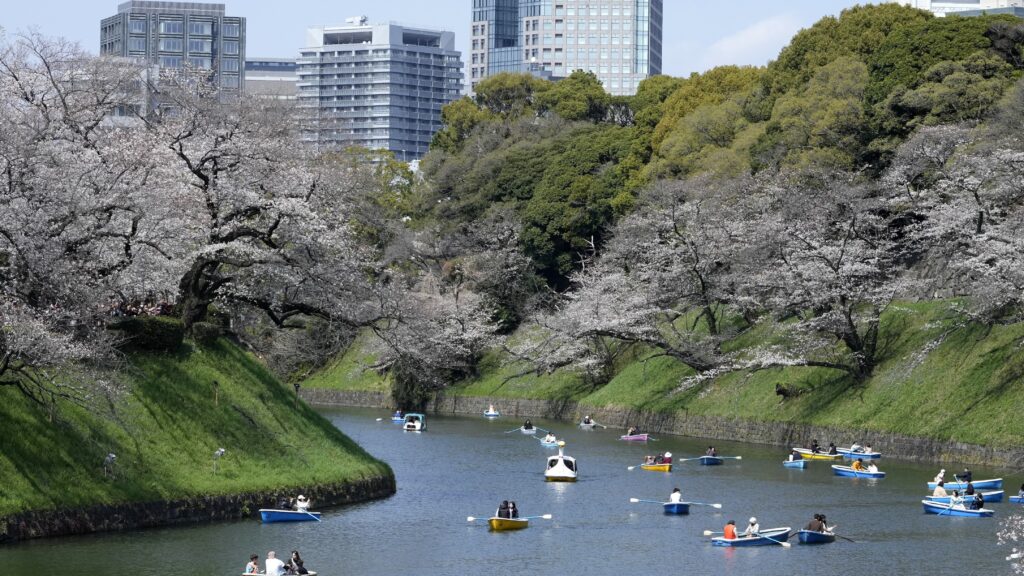On 27 September the world said a final farewell to the most iconic and transformative Japanese statesman of the 21st century, Abe Shinzo. While Abe has become the face of Japan in the 2010s thanks to his unprecedently long tenure as PM, his state funeral stirred controversy and debate at home, which shows that his legacy is divided at home. Let’s take a look at why.
On 27 September Japan and the world said a final farewell to Abe Shinzo at the state funeral held at the famous Nippon Budokan, the martial arts stadium built for the 1964 Tokyo Olympics and made famous by the iconic performance of the Beatles. It was a heartfelt ceremony in front of a crowd of over 4,000 mourners, including dignitaries from all around the world. US vice president Kamala Harris, Indian PM Narendra Modi, Singapore PM Lee Hsien Loong, present and former prime ministers from Australia among others gathered in Tokyo to pay a final respect to the iconic conservative statesman. [You can read Hungarian Conservative’s eulogy here.] A special stand had been erected near the venue to receive flowers from members of the public, while inside the Budokan Abe’s gigantic portrait faced the attendees. There were heart-stirring speeches by prime minister Kishida Fumio, and Suga Yoshihide, a long-time Abe ally, who succeeded Abe in the prime ministerial position in 2020, when Abe stepped down under pressure during the pandemic. The speeches were read out in English by the influential conservative journalist, Abe’s former speech writer, Taniguchi Tomohiko, who visited Hungary in 2019.
The ceremony was touching yet sombre and subdued, not only because Abe already had a funeral in July in Tokyo and on the Abe family’s home turf of Yamaguchi prefecture, but also due to the widespread controversy and heated debates that followed the announcement of the plan to hold a state ceremony for the late prime minister. From a Hungarian perspective, it is quite natural to grant a state funeral to a leader who not only was in power for an unprecedently long time, but who was also the most influential and transformative politician of the past decades. The disconnect between the assessment of his legacy abroad and at home cries out for an explanation.
Although he had stepped down citing health reasons in August 2020, under pressure for his tackling of the coronavirus pandemic, Abe was at the peak of power at the time of his death. He remained the most influential politician in the ruling LDP, a kingmaker, who, shortly before his death, formally took over the leadership of the biggest faction in the party. This is not uncommon in Japanese politics: many former prime ministers—notable examples include Tanaka Kakuei and Mori Yoshiro—became more powerful after their tenures, a phenomenon often described as the ‘shadow shoguns’.
Abe was a hereditary politician, both on his father’s and on his mother’s side. Both of his grandfathers were significant figures in Japanese history. Kishi Nobuo served as an influential and controversial prime minister in the sixties, while Abe Kan was a famous anti-war politician in the forties, who tried to prevent Japan getting into the war and worked on ousting the warmongering prime minister Tojo Hideki, a class A war criminal after the defeat. Unfortunately, most writings only mention Kishi, amplifying the supposedly ‘far-right’ image of Abe. The young Shinzo learned politics working with his father as his secretary, and his star continuously rose. He was destined to become a leader, which was realised in 2006. His first tenure as PM didn’t work out the way he may have imagined. His one-year-and-one-day-long premiership was scandal-ridden, with one cabinet member even committing suicide to avoid impeachment for mishandling public funds.
Abe was forced to step down citing health reasons, just like later in 2020, left in disgrace, and Japan continued its tradition of revolving door prime ministers. But his first premiership was business left unfinished for him. Nobody predicted his victorious comeback in December 2012: Abe Shinzo not only returned to power with a landslide election win, gaining supermajority in the lower house, but also became the longest serving prime minister in the history of Japan; a record that seems very unlikely to be broken in the foreseeable future.
Abe understood the call of the times in the changing world order
Abe not only learned from the mistakes from his failed first term but understood the call of the times in the changing world order. No previous Japanese prime minister showed such leadership and made fundamental changes in the country’s foreign policy in our century as Abe did. Abe visited 80 countries in the world during his second term, between 2012 and 2020, a record for a prime minister. There were high hopes that he would come to Hungary, where no Japanese prime minister had visited since January 1990, but unfortunately the coronavirus pandemic and his subsequent resignation prevented that from happening.
While Abe understood the challenge posed by a rising and ever more assertive China, but sought to repair ties instead of confrontation, and went to great lengths to normalise relations with Russia with the aim to finally sign a peace treaty with Moscow, an issue left unresolved since 1945. He met no less than 27 times (!) with Vladimir Putin, though his efforts bore no fruit in the end. At least he wasn’t malevolently labelled as the Trojan horse of the Kremlin as Hungarian PM Viktor Orbán, who has similarly chosen the strategy of cooperation, not confrontation.
Stephen Nagy, a leading Tokyo-based scholar of Hungarian extraction rightly wrote in one of his op-ed that ‘Japan’s transformative statesman not only defended democracy; he sought to repair ties with China for a more secure world’, stressing that his real legacy is that
‘Abe, with like-minded partners, had China’s rise in mind, seeing the Free and Open Indo-Pacific vision as an approach that advocated for a nonzero sum approach to the biggest geopolitical challenge of our times. His vision was meant to prevent a Machiavellian, might-is-right approach to international relations in Japan’s backyard and globally from emerging.‘
His death has left a vacuum in Japanese politics, even the future of his faction, the biggest in the LDP, is in doubt. He was so transformative and visionary that one his best biographer rightly says that ‘Abe will continue to govern Japan for years after his death‘. We could easily conclude that if there is someone who really deserves a state funeral, then Abe is. But things are more complicated than that.
For the rest of the world, Abe was long the face of Japan, thanks to his unique character, his unprecedent activity in foreign policy and long tenure. Abe’s legacy in the world is defined by this, but at home he has remained divisive and controversial even in his death.
In fact, in every single poll conducted, the majority opposed holding a state funeral. There were online petitions and street demonstrations, with an elderly man even setting himself on fire next to the Kantei in protest. One of the arguments in the debate is that state funerals are an outdated institution popular in the militarist era that is used for nationalistic purposes, but without a legal background since 1947. Another objection has been that Kishida announced the plan to hold a state funeral for Abe without consultation and debate, with a simple government decision. What look liked a wise move first proved to be a political own goal for Kishida.
As for his legacy, Abe’s economic policy, quickly winning the popular nickname ‘Abenomics’, achieved mixed results. It mostly remained spectacular slogans combined with increased government spending and money printing, euphemistically dubbed ‘monetary easing.’ In 2020, the average Japanese worker was hardly better off than in 2012. On the other hand, the stock exchange doubled, and the corporate sector is hoarding cash in volumes like never before.
Abe successfully centralised power and strengthened political leadership
While abroad he is viewed as the champion of democracy and free trade, at home he was often labelled as an autocratic leader who suppressed democracy, the freedom of the press and expression. One leading Japanese scholar, Nakano Koichi went as far as calling him ‘Trump before Trump’, originally a compliment from Steve Bannon. Abe indeed successfully centralised power and strengthened political leadership, and had outstanding political skills to continuously win elections, at the same time keep things under his control inside the LDP as well. But looking at it from the outside, it is difficult to buy into the claim of the oppression of the press when in the Japanese media, even at NHK, the public broadcaster, there have been open debates and criticism about the necessity or legality of his state funeral. The Trump comparison fails, but it shows Abe’s diplomatic skills that he was among the first to realise the importance of building a personal relationship with the eccentric new leader in the White House. For the Hungarian and European readers, a better comparison would be Viktor Orbán, the remarkably successful yet similarly criticised conservative prime minister of Hungary. Both politicians shared similar political views, both managed to control power in their parties and maintain a winning streak at national elections in very similar, mixed (single seat constituencies and proportional lists), one-round electoral systems against a fragmented and discredited opposition. Both understood the importance of political governing and increased the role and the influence of the prime minister and the prime minister’s cabinet, referred to as ‘Kantei’ in Japanese. Both pursued a proactive foreign policy trying to maintain normal and mutually beneficial relationship with all major powers including China and Russia. And both leaders had been continuously attacked and received labels such as autocrats or populists.
One other important factor behind the controversy about the state funeral is that Abe’s second term was also marred by scandals. These scandals hardly mean anything or are known abroad, while in Japan they were at the centre of the political discourse, and tainted Abe’s legacy at home. It is difficult to explain the Sakura viewing party scandal to the average foreigner who does not follow Japanese politics. According to the accusations, Abe used public funds to entertain his own donors at the yearly sakura (cherry blossom) viewing parties hosted by him. Abe was never charged, but he officially apologised. It needs to be noted that campaign finance regulations are so strict in Japan, that it is next to impossible not to violate them if someone is really serious about winning a seat in the parliament. Another example is the Moritomo Gakuen scandal, of which not many readers may have heard before. In 2017, a private school named Moritomo Gakuen close to Abe Akie, the late prime minister’s wife, bought land from the central government at a heavily discounted price. Documents related to the acquisition were falsified and destroyed. Abe was never officially accused or charged, but one finance ministry official involved in the cover-up committed suicide later. (The story even inspired a successful Netflix mini-series in Japan, ‘The Journalist‘, which I highly recommend to anyone interested in Japanese politics and society.) These stories remained inside Japan, one explanation for the difference between how Abe’s legacy is viewed at home and abroad.
Abe’s legacy can and will be debated, researched, and analysed. However, we cannot deny the fact the Abe Shinzo was, and will probably remain for long, the most iconic, visionary, and transformative political leader in the 21st century history of Japan, who deserves a proper farewell. To quote the words of the Hungarian prime minister: Rest in peace, Abe san!
[1] Its current name is Comprehensive and Progressive Agreement for Trans-Pacific Partnership (CPTPP)








